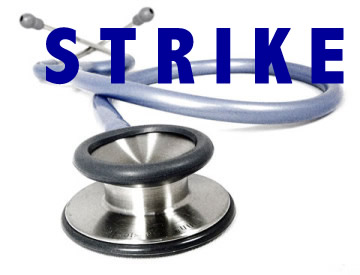Doctors’ strike grounds services across Lagos hospitals
By Ijeoma Nwanosike and Okwuokei Favour
Medical services in several government hospitals across Lagos were severely disrupted on Monday and Tuesday due to a three-day warning strike by members of the Medical Guild over alleged unilateral salary deductions and other unresolved grievances.
A visit to the Lagos State University Teaching Hospital (LASUTH), Ikeja, on Tuesday morning revealed an unusually deserted scene. The usually busy environment was replaced by silence, with only a few individuals seen within the premises. At the Mother and Child Centre, Ayinke House—home to the hospital’s obstetrics and gynaecology departments—an unmedical staff member on duty informed The Guardian that doctors were not attending to patients due to the ongoing strike. She said consultations had been suspended since Monday and that patients would need to return on Thursday when the strike is expected to end.
A tour of other hospital departments, including the orthopaedic unit, ENT, and outpatient surgical services, confirmed a complete shutdown. A financial officer, also on duty, attributed the doctors’ withdrawal of services to frustration over unpaid salaries. He clarified that only emergency cases were being attended to and that patients with non-urgent conditions would not be seen. At the paediatric unit, the situation remained unchanged, with empty corridors and no sign of medical activity.
At Gbagada General Hospital, the secretary on duty also confirmed that doctors were observing the strike. However, further inquiry revealed that essential services still continued, especially in the emergency unit. A relative of a patient admitted, who simply identified herself as Mrs. Abiose, told The Guardian that doctors and nurses were quietly attending to emergency cases and patients already admitted. At the emergency ward, Abiose explained that although she was unsure whether consultations were taking place outside the emergency area, she commended the medical staff for continued care. “I give kudos to them because the strike did not stop them from attending to cases unlike before,” she said.
Elsewhere, at Isolo General Hospital, the effects of the strike were more evident. Upon arriving at the facility, several patients confirmed that doctors had not been available since Monday. One was a pregnant woman who was distressed after being unable to access a scheduled antenatal scan. She said she had been told to check her baby’s position, but neither the doctor nor the scan specialist was present. Another patient experiencing eye discomfort said she was waiting to see a doctor for diagnosis and possible treatment but was told to return later in the week, as doctors were unavailable.
At Randle General Hospital in Surulere, hospital activities were halted as both doctors and nurses reportedly participated in industrial action. A source from the facility confirmed the development and said the situation had left many patients stranded.
The fallout from the strike extended to the Federal Medical Centre (FMC), Ebute-Metta, where the patient load reportedly increased following the shutdown of state hospitals. A source at the FMC told The Guardian that the hospital had seen an overwhelming number of patients since Monday, far more than usual. A doctor at the facility confirmed this, noting that the workload had greatly risen due to patients seeking alternatives after the service disruption at state hospitals.
In response to the industrial action, the Lagos State Government acknowledged the issues raised by the Medical Guild. In a statement issued by the Ministry of Health on 27 July, the government said it was aware of the Guild’s press conference held on 26 July and the subsequent declaration of a three-day warning strike beginning on 28 July.
The ministry assured residents that the concerns of the doctors were being addressed with urgency and sincerity. It stated that a Conciliation Committee, comprising representatives of the Guild and government officials, had already been established to resolve the issues. Documents submitted by the Guild were presently under review in accordance with existing policies and fiscal regulations.
Highlighting the importance of maintaining industrial harmony within the health sector, the statement called on the Medical Guild to pursue ongoing dialogue for a peaceful resolution. “We urge the Medical Guild to continue on the path of dialogue while we work to reach a peaceful and just resolution in the interest of all parties, especially the residents who may bear the brunt of any service disruption,” it read.
The government also announced that contingency plans are being put in place to minimise the impact of the strike on health services.







